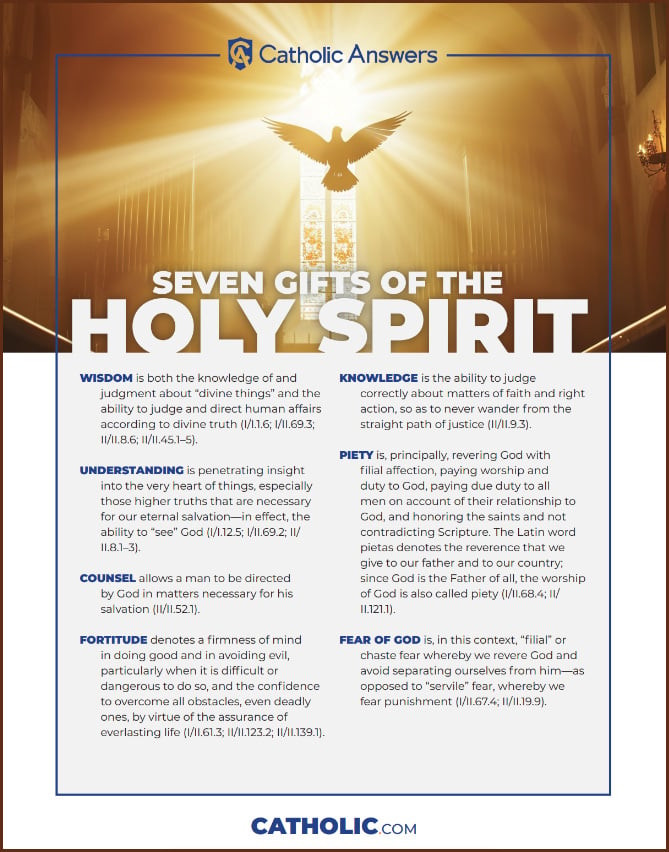For centuries, Catholic tradition has highlighted seven gifts of the Holy Spirit: wisdom, understanding, counsel, fortitude, knowledge, piety, and fear of God. These aren’t just abstract concepts; they are powerful spiritual endowments believed to be granted to every Christian, guiding them towards a holier and more fulfilling life. Rooted in scripture and elaborated upon by theologians like St. Thomas Aquinas, these gifts offer a roadmap for spiritual growth and a deeper connection with the divine.
Delving into the Seven Gifts: A Closer Look
To truly appreciate the significance of these gifts, it’s essential to understand each one individually. St. Thomas Aquinas, a towering figure in Catholic theology, provided a comprehensive interpretation of these gifts in his Summa Theologiae during the 13th century. His framework remains a cornerstone for understanding these spiritual graces.
1. Wisdom: Seeing with Divine Perspective
Wisdom, in the context of the Holy Spirit, transcends mere worldly knowledge. It encompasses both the profound understanding of “divine things” and the discernment to navigate human affairs guided by divine truth. It’s about perceiving the world and our lives within it from God’s perspective. Wisdom allows us to judge and direct our actions in accordance with God’s will, leading us towards ultimate good. It’s not just about knowing facts, but about applying divine truth to our daily lives and decisions.
2. Understanding: Grasping Deeper Truths
Understanding is more than just intellectual comprehension; it’s a penetrating insight into the essence of things, particularly those profound truths vital for our eternal salvation. This gift enables us to grasp the deeper meaning behind religious teachings and spiritual realities. Essentially, understanding provides the “ability to see” God in our lives and the world around us. It’s about moving beyond surface-level interpretations and delving into the heart of divine mysteries.
3. Counsel: Divine Guidance in Decision-Making
Counsel, also known as right judgment, is the gift that allows us to be guided by God in matters crucial for our salvation. It’s about seeking and receiving divine direction in our decisions, ensuring we are on the right path. This gift helps us to discern God’s will in specific situations, providing clarity and direction when faced with moral dilemmas or life choices. It’s like having a divine advisor available to guide us.
4. Fortitude: Courage and Strength in Faith
Fortitude is often understood as courage, but in the context of the gifts, it’s a firmness of mind in pursuing good and resisting evil, especially when faced with difficulty or danger. It’s the spiritual strength that empowers us to overcome obstacles and persevere in our faith, even in the face of adversity. Fortitude provides the confidence to conquer challenges, even life-threatening ones, fueled by the assurance of eternal life. This gift is crucial for maintaining faith and moral integrity in a world that often challenges those values.
5. Knowledge: Discerning Divine Truth in Everyday Life
Knowledge, in this spiritual sense, is not simply academic learning. It is the ability to judge correctly about matters of faith and righteous action, ensuring we remain on the path of justice. This gift helps us to apply divine teachings to our daily lives, enabling us to discern truth from falsehood and right from wrong in practical situations. It’s about living our faith authentically and consistently in our everyday actions and choices.
6. Piety: Reverence and Filial Affection for God
Piety, sometimes referred to as reverence, is fundamentally about revering God with filial affection, offering worship and duty to Him. It also extends to showing due respect to all people because of their relationship to God, and honoring saints and Scripture. The Latin root pietas signifies the respect we owe to our parents and homeland; as God is the ultimate Father, worshiping Him is also considered piety. This gift cultivates a sense of loving devotion and respect towards God and all His creation.
7. Fear of God: Awe and Reverence, Not Servile Fear
Fear of God, in this context, is not about being terrified of punishment. It is “filial” or chaste fear, a profound reverence for God that motivates us to avoid separation from Him. This is distinct from “servile” fear, which is simply fearing punishment. Filial fear is born out of love and awe for God’s greatness and holiness, inspiring us to live in accordance with His will out of respect and love, not just out of fear of consequences.
 Image thumbnail of the printable PDF Seven Gifts of the Holy Spirit
Image thumbnail of the printable PDF Seven Gifts of the Holy Spirit
Alt text: Printable PDF thumbnail showcasing the Seven Gifts of the Holy Spirit, ideal for educational or personal reflection on spiritual growth.
Gifts for Spiritual Growth and the Kingdom of God
These seven gifts are not meant to be dormant ideals. They are “habits,” “instincts,” or “dispositions” granted by God as supernatural assistance for our spiritual perfection. They empower us to transcend human limitations and partake in God’s very life, as promised by Christ. Aquinas emphasized their necessity for salvation, which he believed was unattainable through human effort alone. These gifts “perfect” the cardinal virtues (prudence, justice, fortitude, and temperance) and the theological virtues (faith, hope, and charity). Charity, or love, is seen as the key that unlocks the power of these gifts, activating them within our souls after baptism.
The gifts of the Holy Spirit are not isolated graces; they work in synergy with the seven virtues, the twelve fruits of the Spirit, and the eight beatitudes. Virtuous living fosters the emergence of these gifts, and in turn, the exercise of the gifts refines and perfects the virtues. The fruits of the Spirit – love, joy, peace, patience, kindness, goodness, generosity, faithfulness, gentleness, modesty, self-control, and chastity – are produced through the proper utilization of these gifts in a Christian’s life. Ultimately, this harmonious interplay between virtues, gifts, and fruits aims towards achieving the beatitudes, the eight-fold state of blessedness described by Christ in the Sermon on the Mount.
Reclaiming the Gifts: From Neglect to Active Use
Despite their historical significance and profound theological depth, the seven gifts of the Holy Spirit have often suffered from “benign neglect” in contemporary Catholic understanding and catechesis. While many may learn the names of these gifts, a deeper understanding of their meaning and practical application is often lacking. This gap in understanding can hinder spiritual growth and the full realization of the potential these gifts offer.
Historically, pre-Vatican II catechesis, while perhaps emphasizing rote memorization, at least introduced these gifts. However, post-Vatican II approaches, while aiming for a more engaging pedagogy, have sometimes inadvertently further marginalized the seven gifts. Some scholars, like Rev. Charles E. Bouchard, O.P., have identified weaknesses in traditional catechesis, including:
- Neglecting the vital connection between the seven gifts and the cardinal and theological virtues.
- Confining the gifts to the realm of mystical spirituality rather than practical moral theology.
- Creating a sense of spiritual elitism, suggesting these gifts are primarily for clergy and religious, not the laity.
- Overlooking the scriptural foundation of the gifts, particularly Isaiah 11.
While the Catechism of the Catholic Church (1992) attempted to address some of these issues, its limited treatment of the gifts compared to the virtues may have inadvertently contributed to continued confusion and neglect in catechetical practices.
A Biblical Approach: The Gifts as Spiritual Arsenal
To move beyond both outdated rote learning and contemporary ambiguity, a return to the biblical source material, particularly Isaiah 11:1-3, offers a revitalized understanding. This passage, a Messianic prophecy, is the sole instance in the Bible where all seven qualities are listed together:
“There shall come forth a shoot from the stump of Jesse, and a branch shall grow out of his roots. And the Spirit of the Lord shall rest upon him, the spirit of wisdom and understanding, the spirit of counsel and might, the spirit of knowledge and the fear of the Lord. And his delight shall be in the fear of the Lord.” (Isaiah 11:1-3, ESV)
These gifts are deeply rooted in the ancient Israelite “Wisdom” tradition, found in books like Job, Proverbs, and Psalms. This tradition emphasizes the practical application of faith to everyday life, focusing on ethical living, relationships, and navigating the complexities of human existence. Isaiah 11 reinforces this practical context, depicting the “shoot of Jesse” establishing a kingdom characterized by justice and righteousness in the real world.
Understanding the gifts within this “Wisdom” framework highlights their practical role in the lives of Christians actively engaged in building God’s kingdom on Earth. It shifts the focus from a purely otherworldly spirituality to one that is grounded in daily life and action. The seven gifts are not just for personal sanctification; they are “indispensable resources in the struggle to establish the kingdom”. They are, in essence, spiritual weaponry for “spiritual warfare”.
Just as soldiers need proper equipment for battle, Christians need the seven gifts to effectively navigate the challenges of life and advance God’s kingdom. Developing these gifts is not a passive process; it requires active engagement in virtuous living and a commitment to using these gifts for their intended purpose: transforming the world for Christ.
The journey of developing these gifts begins with recognizing our limitations (fear of the Lord), embracing our place in God’s family (piety), and learning to follow God’s guidance (knowledge). This foundation fosters the strength to confront evil (fortitude) and the strategic thinking to navigate life’s complexities (counsel). Through active engagement in “spiritual warfare,” we gain a deeper understanding of God’s plan (understanding) and become more skilled and effective in fulfilling our unique vocations (wisdom).
Called to be Soldiers of Christ: Embracing the Spiritual Arsenal
This renewed understanding of the seven gifts is particularly relevant for adult Catholics who may have received incomplete catechesis. The image of Christians as “soldiers of Christ,” while perhaps less emphasized in recent decades, resonates with the active, world-transforming nature of these gifts. This imagery is not about physical militancy, but about the spiritual battle against injustice, sin, and the forces that oppose God’s kingdom.
The seven gifts of the Holy Spirit provide the spiritual weaponry needed for this daily spiritual warfare. By actively cultivating these gifts through virtuous living and a commitment to serving God’s kingdom, Christians can unlock their full spiritual potential and become effective agents of transformation in the world. It’s time to reclaim these powerful gifts, not as dusty relics of tradition, but as dynamic tools for spiritual growth and building a more just and loving world.

